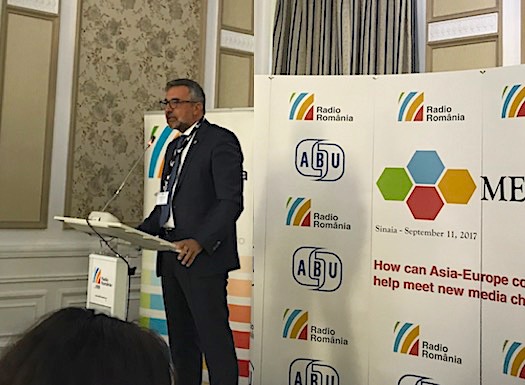Opening this year's Media2020 Conference in Sinaia, Romania's Culture Minister Lucian Romascanu said the conference is “more than having a technical discussion.”
“This conference is about building bridges between cultures. We bring together our souls and this is the basis for peace.”
Romascanu said we “are travelling through delicate times,” in today's world. “Whoever is managing media should understand its importance… people will act through the information we give them.”
“Public channels need to stick to their mission,” he said.
“Media's role comes from the constitution of the country – to inform and educate people. It is more important than ever in these times that we bring the right information to people in order to retain peace all around the world.”
The ABU's Javad Mottaghi said:
“We live in a world where nothing can be taken for granted. Refugees are moving to safety all over the world… The US Election and Brexit are two examples of new scenarios that have brought populism into power.
“The world is both divided and interconnected as never before. We are in the midst of a new world order where media and the internet reaches people like never before.
“The only certainty is uncertainty. Media companies need to navigate the uncertainty.
It is important that we tackle the issues… Thank you for bringing your expertise from across the globe to share knowledge and solutions when disruption is the new watchword.”
Georgica Severin (pictured right), the Acting Director General of conference host Radio Romania, weclomed delegates to his country from Asia and Europe, to discuss topics of common interest.
“By the year 2020 broadcasting will have undergone major transformations that will continue to challenge us.
“We need to increase our content and make it more appealing and targeted to younger audiences, and we should be proactive in recognising the challenges we face every day,” he said.
Session 1: Trends in Media Development
Key points from the first session were the role of public broadcasters in a time of fragmenting audience attention and increasing competition.
David Jordan, Director fo Editorial Policy and Standards at the BBC said:
“There has always been a role for public service media. It is the glue in our society. We produce content that gives the nation a single point of reference… our work solidifies the notion of community.
“It is a huge challenge now in the time of fragmentation of audiences, but fortunately we are still able to do that… One of our roles is to make sure everyone has access to impartial and accurate information.”
Pushed on whether it was the role of public broadcasters to bring consensus to a country on difficult issues, Jordan said:
“We have never been asked to reconcile different political views or bring a consensus, but our job is to use media to build a sense of identity…
At present, some media tend to polarise the community… The job of Public Service Broadcasters has never been to coalesce the population to a single view, it is to reflect the many views of people in the country.”
Fayyaz Sheheryar, the Director General of India’s Prasar Bharati said the biggest problem facing his country’s national broadcaster is to ‘reach the last man,’ to get media to every person in the country at the lowest cost to the people.
“To do this we cannot limit ourselves to one technology, we need to reach people in analog and digital, whoever and wherever they are in our country…
“But sometimes we focus too much on technology without giving proper focus to the content. The problem of people in South Asia is loss of identity in eh face of so much foreign media. Or media can correct this by bringing them the world in their own dialect.”
Sally-Ann Wilson, CEO of the Public Media Alliance gave an example of innovative activities from one of her member broadcasters.
“In Taiwan the national broadcaster trains and interacts on a daily basis with citizen journos. Filing media stories to the national broadcaster is part of the national schools curriculum.”
She reminded broadcasters that, in the face of new media challenges, there are some traditional strengths that are still important to broadcasters. “Finding the moment when people come to you and want to share their news, there are moments in every country where the media cna bring people together’
“Very often great media is still about stortelling. It doesnt matter if icontent is short or long story, it’s how you tell the story that will get audiences and bring them together.
“If Public Service Media tries too hard, it can be like the embarrasing uncle who tried too hard to dance at the teenagers party. We want to be the low profile but reliable aunt who is always there for you, not the out of touch uncle who thinks he is conencted to you, but really isn’t.”
She also urged broadcasters to “invest in media literacy” to let people know who is selling something and why, that goes for selling political policy ideas as well as selling products.
Media2020 is combined with the Public Broadcasting PBI Conference, both being held in Romania. We will bring you more coverage of the two conferences here on AsiaRadioToday over the next few days.

